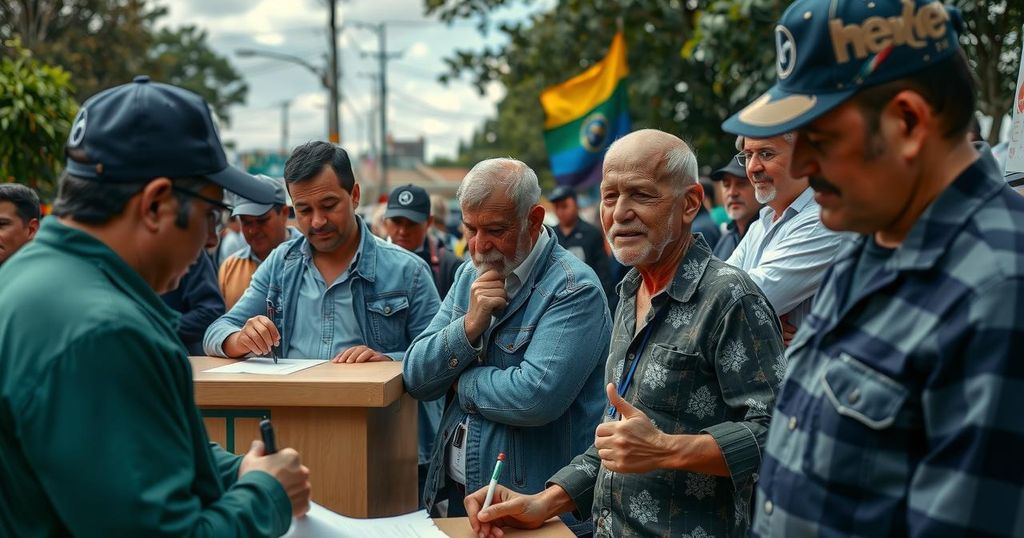Uruguayian Election: A Reflection of Political Stability with Moderate Candidates
Uruguay conducted a presidential election characterized by moderate candidates and high voter turnout. The election reflected the nation’s political stability and civility, contrasting sharply with regional trends of division. The primary issues included a contentious social security referendum and general economic concerns, with voters largely satisfied with the current government.
In Montevideo, Uruguay, citizens cast their votes in a presidential election featuring two centrist candidates, underscoring the nation’s political stability amidst a backdrop of growing divisions in other Latin American countries. With approximately 2.7 million eligible voters participating, the election also included parliamentary selections and a significant referendum aimed at reforming the social security system. As the polls closed with a reported turnout exceeding 88 percent, locals awaited the results, anticipated to be revealed shortly thereafter. The campaign concentrated heavily on the contentious pension vote, which would potentially increase the fiscal deficit in one of Latin America’s wealthiest nations. Although candidates broadly agreed on various issues, analysts predict that the election will not lead to substantial shifts in policy; Uruguay is known for its long-standing democratic stability. Political analyst Juan Cruz Díaz remarked, “In a way, Uruguay has been boring, but boring in this sense is very good.” Unlike the tumultuous political sentiments observed in Brazil and Argentina, Uruguay’s electorate has largely expressed contentment with the current government’s pro-business strategies and steady economic performance. Presently, the center-right President Luis Lacalle Pou enjoys a 50 percent approval rating. Campaign activities in Uruguay have been marked by civility, contrasting sharply with the heightened tensions common in other nations, such as the United States and Argentina. On election day, the Rambla, a prominent coastal avenue in Montevideo, served as a vibrant rallying point for supporters of both the conservative and liberal coalitions. Álvaro Delgado, the ruling party’s candidate and former chief of staff to Lacalle Pou, expressed pride in the electoral process, stating on social media, “We voted with joy in a very special election, appreciating this democracy that makes us proud and Uruguay’s spirit of respect and tolerance.” His opponent, Yamandú Orsi, a center-left candidate and former mayor, reinforced the importance of democracy, saying, “Uruguay has had the happiness for 40 uninterrupted years … the happiness that our citizens can elect their leaders.” Despite leading in recent polls with 44 percent, Orsi may still require a run-off election if he fails to secure an outright majority. In a more distant third position is Andrés Ojeda, a dynamic lawyer cultivating a following among younger voters through unconventional campaign strategies. The election has also focused on rising crime rates and issues related to child poverty. Of notable significance is the referendum concerning Uruguay’s social security overhaul, which is poised to reshape a system budgeted at $23 billion. Both leading candidates oppose the proposal, asserting potential negative fiscal implications, yet proponents argue that it aims to redistribute wealth more equitably in a country where the minimum pension averages around $450 a month. As voter sentiments culminated on this significant election day, the nation continued to exemplify its tradition of democratic participation and stability, remaining a notable contrast to the evolving political landscapes of its regional neighbors.
Uruguay is often regarded as a beacon of political stability and democratic governance in South America, characterized by its moderate political climate. The current election is emblematic of this stability as voters choose between candidates who share a general consensus on key issues. With compulsory voting laws enhancing participation, the electoral process in Uruguay has historically been peaceful and devoid of the extreme divisions seen in other Latin American nations, such as Brazil and Argentina. This election also includes a contentious issue regarding social security reforms, reflective of broader socio-economic challenges faced across the region, particularly concerning child poverty and public safety.
Uruguayan voters participated in an election that featured two moderate candidates, reflecting the nation’s tradition of political stability unlike many of its neighbors experiencing polarization. With significant turnout and a focus on both presidential and parliamentary elections alongside a crucial referendum on social security, Uruguay’s electoral landscape demonstrates an engaging yet moderately paced political evolution. Analysts predict continuity rather than upheaval, aligning with the electorate’s apparent satisfaction with existing policies and government performance.
Original Source: www.pbs.org




Post Comment